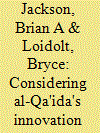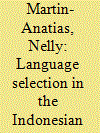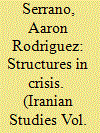| Srl | Item |
| 1 |
ID:
162247


|
|
|
|
|
| Summary/Abstract |
Can textual analysis improve statistical prediction of risky geopolitical events? North Korea is the greatest source of geopolitical risk for South Korea due to the former’s unpredictable and secretive military actions against the latter. We find that the tone of English language news articles published by non-South Korean news media, especially U.K. news media, has significant predictive power about North Korean military aggressions. The inclusion of language tone improves the predictive power of the empirical model by as much as 47%.
|
|
|
|
|
|
|
|
|
|
|
|
|
|
|
|
| 2 |
ID:
120331


|
|
|
|
|
| Publication |
2013.
|
| Summary/Abstract |
Understanding how terrorist groups innovate and adapt is key for anticipating future shifts in terrorist threats. Past innovation studies have identified factors that shape group behavior, as well as the importance of combining study of organizations' innovation doctrines with data on how these doctrines are put into practice. Here we describe such an analysis for two texts that have shaped al-Qa'ida and its associated movements' strategies: contrasting Naji's Management of Savagery with al-Suri's Call to Global Islamic Resistance-including elements of the latter relevant to innovation specifically translated for this work. Though open source data on the groups' innovation practices are necessarily more sparse, we contrast the doctrinal texts with selected examples, which suggest caution in assuming that group doctrine is necessarily put into practice "as written."
[Supplemental materials are available for this article. Please visit the publisher's online edition of Terrorism and Political Violence for the following free, supplemental resource: Translation of portions of Abu Mus'ab al-Suri's The Call for Global Islamic Resistance, relating to innovation and learning.]
|
|
|
|
|
|
|
|
|
|
|
|
|
|
|
|
| 3 |
ID:
142780


|
|
|
|
|
| Summary/Abstract |
Over the last twenty years, European Union (EU) actorness at both regional and global scales, has become a fruitful topic of analysis in the field of political science, and more specifically in international relations and political geography. Critical geopolitics dedicated many substantive papers on EU discourses and representations. Our paper aims at providing a complementary way to study texts issued by the EU and to question EU actorness by adopting an approach based on textual analysis. The corpus examined includes the seven communications on the European Neighbourhood Policy (ENP) issued between 2003 and 2013. These communications provide essential information regarding relations between the EU and its immediate neighbours. The textual analysis allows several relevant characteristics of discourses to be highlighted: stability and changes, actors, spaces and scales mentioned. The outcomes of the analysis confirm previous research on the subject: The ENP appears as a bilateral state-centric policy, missing global scale, and neglecting the role of regional powers like Turkey or Russia.
|
|
|
|
|
|
|
|
|
|
|
|
|
|
|
|
| 4 |
ID:
163113


|
|
|
|
|
| Summary/Abstract |
In the post-New Order era, the use of English in Indonesia is noticeably increasing, particularly in otherwise Indonesian popular print texts, a domain where language selection is evident and publicly accessible. The appearance of English in Indonesian popular texts is linguistically known as code-switching, called bahasa gado-gado in the Indonesian context. Although noticeably increasing, English is still unfairly treated by many Indonesians and by the government as a foreign language that carries the “West” ideology. In other words, English not only functions as a linguistic resource but also as a language of Otherness that may carry some Western ideologies for many Indonesians. In fact, the juxtaposition of English and Indonesian in otherwise Indonesian speech acts still receives social censure or is seen as an interference to Indonesian-ness. Using an interpretive textual analysis, I show that code-switching with special reference to English effectively functions to express the overt love expressions and to project one’s socio-cultural hybridity and lingustic proficiency.
|
|
|
|
|
|
|
|
|
|
|
|
|
|
|
|
| 5 |
ID:
177055


|
|
|
|
|
| Summary/Abstract |
This paper proposes an exploration of the films of Iranian director Asghar Farhadi. It employs a methodology based on textual analysis, focusing specifically on the structural design of his films and the focalization processes of his scripts. It shows how Farhadi’s work can be understood as a coherent research project with a uniquely solid model based on chronological linearity as a way to explore the violent breakdown of different emotional communities: families, marriages, groups of friends, etc. At the same time, it considers how all the focalization processes in his films are oriented toward two main concepts: knowledge (of the characters, but also of the audience) and pain (of living in a [narrative] world afflicted by meaninglessness).
|
|
|
|
|
|
|
|
|
|
|
|
|
|
|
|